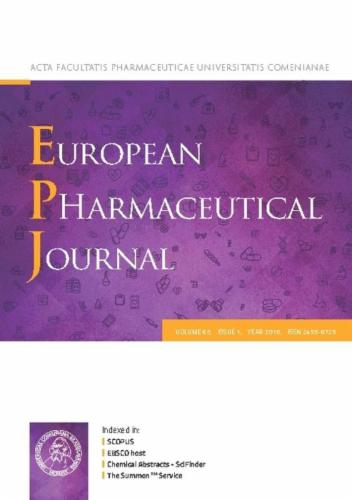Microfluidic-assisted synthesis of integrin-targeting cRGD liposomes as a scalable strategy for theranostic applications in triple-negative breast cancer
IF 4.7
3区 医学
Q1 PHARMACOLOGY & PHARMACY
引用次数: 0
Abstract
Triple negative breast cancer (TNBC) represents one of the most aggressive types of cancer, with a difficult treatment leading to poor prognosis of the disease. Herein we report the synthesis of a custom-made cyclic RGD peptide (cRGD), and its use in decorating liposomes for targeted drug delivery of doxorubicin to TNBC cells overexpressing integrin receptor αvβ3. Liposomes carrying dibenzocyclooctine groups on their surface were produced using an optimized large scale microfluidic-assisted approach and subsequently conjugated with cRGD bearing an acyl azide group by means of a click chemistry reaction. This functionalization promotes enhanced cellular uptake via integrin-mediated endocytosis. In vitro assessments confirm enhanced selectivity and cytotoxicity of cRGD-liposomes against triple-negative cancer cells, in addition to dual imaging capabilities by fluorescence and magnetic resonance techniques due to the incorporation of a fluorescent dye and gadolinium complex, respectively. These features support the potential of cRGD-liposomes as a promising platform for targeted drug delivery to specific cancer cell populations, establishing them as viable theranostic agents for precision medicine applications.

微流体辅助合成整合素靶向cRGD脂质体作为三阴性乳腺癌治疗应用的可扩展策略。
三阴性乳腺癌(TNBC)是最具侵袭性的癌症类型之一,治疗困难导致疾病预后不良。本文报道了一种定制的环状RGD肽(cRGD)的合成,并将其用于修饰脂质体,用于将阿霉素靶向递送到过表达整合素受体αvβ3的TNBC细胞。采用优化的大规模微流体辅助方法制备了表面携带二苯并环环汀基团的脂质体,随后通过点击化学反应与携带酰基叠氮基团的cRGD偶联。这种功能化通过整合素介导的内吞作用促进增强的细胞摄取。体外评估证实了crgd -脂质体对三阴性癌细胞的选择性和细胞毒性增强,此外,由于分别加入了荧光染料和钆络合物,crgd -脂质体具有荧光和磁共振技术的双重成像能力。这些特性支持了crgd -脂质体作为靶向药物输送到特定癌细胞群的有前途的平台的潜力,使其成为精准医学应用的可行治疗药物。
本文章由计算机程序翻译,如有差异,请以英文原文为准。
求助全文
约1分钟内获得全文
求助全文
来源期刊
CiteScore
9.60
自引率
2.20%
发文量
248
审稿时长
50 days
期刊介绍:
The journal publishes research articles, review articles and scientific commentaries on all aspects of the pharmaceutical sciences with emphasis on conceptual novelty and scientific quality. The Editors welcome articles in this multidisciplinary field, with a focus on topics relevant for drug discovery and development.
More specifically, the Journal publishes reports on medicinal chemistry, pharmacology, drug absorption and metabolism, pharmacokinetics and pharmacodynamics, pharmaceutical and biomedical analysis, drug delivery (including gene delivery), drug targeting, pharmaceutical technology, pharmaceutical biotechnology and clinical drug evaluation. The journal will typically not give priority to manuscripts focusing primarily on organic synthesis, natural products, adaptation of analytical approaches, or discussions pertaining to drug policy making.
Scientific commentaries and review articles are generally by invitation only or by consent of the Editors. Proceedings of scientific meetings may be published as special issues or supplements to the Journal.

 求助内容:
求助内容: 应助结果提醒方式:
应助结果提醒方式:


